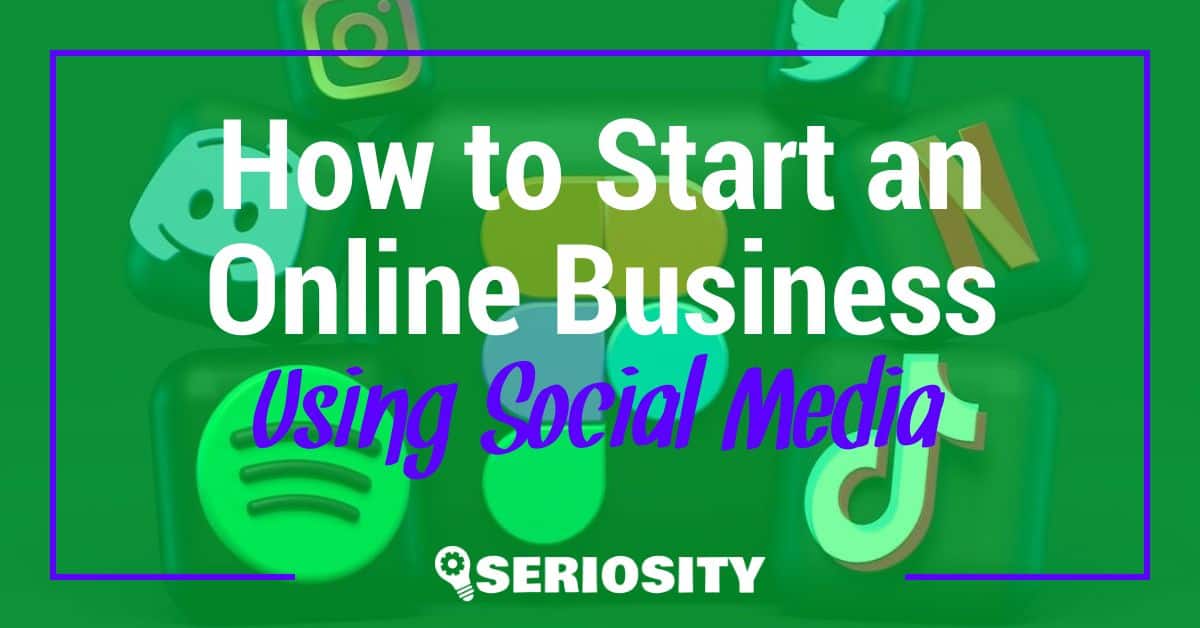In today’s digital landscape, starting an online business using social media has become an increasingly popular and effective method for entrepreneurs looking to connect with potential customers. Social media platforms such as Instagram, Facebook, and LinkedIn offer businesses the opportunity to tap into and target specific audiences while building long-lasting relationships. By utilizing the right strategies and understanding how to effectively engage your audience, launching an online business can be both rewarding and profitable.
One of the key aspects of using social media for your online business is the creation of engaging and relevant content. This includes anything from informative blog posts to eye-catching images that resonate with your target audience. The aim is to increase brand awareness and foster a sense of authenticity, which will ultimately lead to attracting and retaining customers.
Of course, navigating the world of social media to start an online business can seem daunting at first. However, with patience and dedication, the numerous benefits of leveraging social media for your business will become apparent over time, including increased customer loyalty and sales, better insights into your audience, and more opportunities for growth and scalability.
Determining Your Social Media Goals
Brand Awareness
In 2023, increasing brand awareness is a crucial goal for any online business. Social media platforms like Facebook, Instagram, and LinkedIn can help you reach a broader audience. By creating and sharing engaging content, you can foster a strong brand identity and establish a rapport with your customers. Consider these goals:
- Increase followers
- Improve post engagement (likes, comments, shares)
- Boost mentions and shares by influencers
Sales and Leads
Another significant goal for online businesses is generating sales and leads through social media. Platforms like Facebook and Instagram offer advertising options to help you reach your target audience and drive traffic to your website. Here are some objectives to focus on:
- Drive website traffic and conversions
- Track the success of promotional posts and social ads
- Optimize your social media ROI
Customer Service
Social media can also be an excellent medium for providing efficient customer service. By monitoring and responding to comments, messages, and mentions promptly, you can build trust and encourage repeat purchases. Set goals to:
- Answer customer queries within a specific timeframe
- Record and analyze customer feedback
- Address and resolve customer complaints effectively
Community Building
Lastly, fostering a sense of community among your customers can lead to loyalty and word-of-mouth marketing. Social media is an excellent platform for creating and nurturing a community around your brand. Focus on these community-building goals:
- Strengthen customer and brand relationships
- Encourage user-generated content
- Host online events or discussions
By establishing clear social media goals for brand awareness, sales and leads, customer service, and community building, you can effectively start and grow your online business in 2023.
Selecting the Right Platforms
When starting an online business using social media, it’s crucial to select the right platforms to reach your target audience effectively. In this section, we’ll discuss the top social media platforms and their features to help you determine which ones are best suited for your needs.
Facebook is an excellent choice for both B2B and B2C businesses due to its large user base and versatile features. With Facebook, you can:
- Create a business page to share information and updates
- Utilize targeted advertising to reach specific audiences
- Engage with customers through direct messaging and comments
Instagram is ideal for visually-driven businesses, particularly those in the fashion, travel, and food industries. Features include:
- High-quality image and video sharing
- The use of hashtags to increase post visibility
- The option to partner with influencers for sponsored content
Best suited for real-time communication and news updates, Twitter can benefit any business. Key features include:
- Quick and concise messaging with a 280-character limit
- Trending topics and hashtags to stay relevant
- Potential to engage with thought leaders and influencers
A platform catered to professionals, LinkedIn is ideal for B2B businesses and personal branding. Advantages include:
- A strong network of industry professionals
- A platform for sharing articles and thought leadership content
- Job postings and recruitment opportunities
Pinterest is a content-discovery platform that is effective for businesses in creative industries like DIY, design, and crafts. Features include:
- Visually appealing images with links to your content
- Organizing content into boards for easy discovery
- Promoted pins for increased visibility
YouTube
For businesses with a focus on video content, YouTube is an essential platform. Features include:
- A dedicated channel to house all video content
- Subscriber base for increased reach
- Advertisements and monetization options
TikTok
TikTok is a rapidly growing platform centered around short-form video content. Best suited to businesses targeting younger audiences, features include:
- Creative editing tools for engaging content
- Hashtags and challenges for increased visibility
- Potential for viral growth with the right content strategy
Snapchat
Snapchat is another platform targeting younger audiences with a focus on ephemeral content. Key features include:
- Disappearing messages, photos, and videos
- Fun filters and lenses for creative content
- Advertising options with Snap Ads and sponsored lenses
As you consider these platforms for your online business, remember to focus on those that best align with your target audience, content strategy, and overall goals.
Developing a Social Media Marketing Strategy
Identifying Your Target Audience
Before creating a successful social media marketing strategy, it’s essential to determine your target audience. Identify their demographics, interests, and preferences to better tailor your content to their needs. Here are some key aspects to consider:
- Age
- Gender
- Location
- Education level
- Profession
- Income level
- Hobbies and interests
By understanding your target audience, you’ll be able to create content that appeals to them, leading to higher engagement on social media platforms.
Creating Engaging Content
To create engaging content, consider the following tips:
- Match your content to your audience’s personas: By connecting with your target audience’s interests and values, your content is more likely to resonate with them.
- Use a variety of formats: Experiment with different types of content, such as images, videos, articles, and polls, to keep your audience interested.
- Optimize for each platform: Customize your content for each social media platform as the same content might not perform well across all platforms.
- ** Keep the tone consistent:** Maintain a consistent tone of voice that represents your brand throughout all content.
Scheduling and Automating Posts
A crucial aspect of a successful social media marketing strategy is posting consistently. Social media management tools, such as Sprout Social or Buffer, can help streamline content scheduling and automation. These tools enable you to:
- Plan and schedule content in advance
- Automate publishing at optimal times for your audience
- Monitor and respond to comments and messages
Measuring and Analyzing Results
To ensure your social media marketing strategy remains effective, it’s vital to measure and analyze your results. Use social media analytics tools, such as the native analytics provided by each platform, or third-party tools like Hootsuite, to track performance. Focus on the following key performance indicators (KPIs):
- Engagement: Likes, comments, shares, and mentions
- Reach: The number of people who see your content
- Impressions: The number of times your content is displayed
- Clicks: The number of clicks your content receives
- Conversions: The number of users who take a desired action, such as making a purchase or signing up for a newsletter
By analyzing these KPIs, you’ll be able to optimize your social media marketing strategy and achieve your goals more effectively.
Leveraging Various Content Formats
Image-Based Content
Image-based content is a staple for any online business, as visuals can capture attention and spur interest quickly. Creating unique images or sharing relevant visual content related to your niche can help you build a strong following. Don’t hesitate to use memes, quotes, or infographics, as these formats can also generate engagement and shares.
Video Content
Video content is another proven method to build connections with your audience. Creating engaging videos can help showcase your products or services while making it easier for potential customers to understand how you can address their needs. When creating video content, consider various formats such as:
- Tutorials and demos: Show users how to use your product or service effectively.
- Testimonials: Showcase real customers sharing their positive experiences with your brand.
- Behind-the-scenes: Give your audience a glimpse into the inner workings of your business, fostering trust and loyalty.
Live Videos
Live videos offer a more intimate and interactive experience for your audience. Platforms like Facebook, Instagram, and YouTube allow businesses to connect with their audiences in real-time. Use live videos for Q&A sessions, product launches, or even virtual events to build excitement around your brand and encourage active participation.
Short-Form Video
Short-form video content, such as TikTok videos or Instagram Reels, allows you to reach a wider audience within a limited time frame. These snappy, digestible videos are perfect for quick tips, product teasers, or showcasing your brand personality. With attention spans getting shorter, short-form video is an effective tactic to attract and engage your target audience.
User-Generated Content
User-generated content (UGC) is a powerful way to showcase the value of your brand through the experiences and opinions of your existing customers. Encouraging users to create content (such as product reviews or photos using your products) and share it on social media can help build trust and credibility for your online business. Some ideas to promote UGC include:
- Running contests or giveaways
- Collaborating with influencers or partnering with customers as brand ambassadors
- Featuring user-generated content on your own social media channels or website
Remember to provide proper credit and acknowledgments for any UGC that you use. By leveraging these various content formats, you can effectively build a strong online presence for your business using social media.
Effective Advertising Techniques
Social media is a powerful tool for starting an online business. These effective advertising techniques will help you build your presence, reach your target audience, and increase your sales.
Promoting Your Products and Services
Highlighting your products and services on social media is crucial for attracting potential customers. Here are some tips to effectively promote your offerings:
- Create eye-catching visuals and informative captions to showcase your products and services
- Share valuable content that solves your customers’ problems and builds trust
- Schedule consistent posting times based on platform engagement trends
- Engage with your audience by promptly responding to comments and messages
Influencer Marketing
Influencer marketing can effectively increase your brand’s visibility and credibility. Partnering with influencers that align with your business values and target audience can drive traffic and sales. Consider these points when working with influencers:
- Choose influencers with a strong following and high engagement rates
- Collaborate on creating authentic and relatable content
- Set clear expectations and goals for your partnership
- Regularly measure the success of your influencer campaigns
Hashtags and Keywords
Utilizing hashtags and keywords can make your content more discoverable and increase your reach. Keep these strategies in mind:
- Research trending hashtags related to your business and products
- Use niche-specific hashtags to target specific customer groups
- Avoid overusing hashtags: stick to 5-10 relevant hashtags per post
- Include relevant keywords in your captions and descriptions to improve searchability
Building an Engaging Online Community
Networking with Industry Influencers and Peers
Establishing relationships with industry influencers and peers is crucial for online business success. By connecting with these key individuals, you can extend your reach, increasing your brand’s visibility and credibility.
- Follow influencers on social networks such as Twitter, LinkedIn, and Pinterest.
- Comment on their content and engage in relevant discussions.
- Share their content on your channels and give credit to the author.
Interacting with Your Audience
Engaging with your audience is at the core of community building. By actively responding and interacting with your followers, you show that you value their input and create a loyal fan base.
- Respond to comments, messages, and questions promptly.
- Host Q&A sessions, polls, and contests to encourage participation.
- Utilize social media management tools to help streamline your interactions.
| Tool | Purpose |
|---|---|
| Hootsuite | Monitor and manage multiple platforms |
| Buffer | Schedule and automate social posts |
| NapoleonCat | Manage community conversations and CRM |
Managing Growth and Retention
As your online community grows, managing engagement, and retaining followers become increasingly important. Develop strategies to maintain the interest of your audience and encourage continued interaction.
- Regularly analyze your social media performance and identify areas for improvement.
- Monitor discussions and address negative feedback constructively.
- Encourage user-generated content to maintain a sense of community involvement.
Building an engaging online community takes time, effort, and dedication, but it is a valuable asset for any online business. By networking with influencers and peers, consistently interacting with your audience, and managing growth effectively, you can create a thriving social media presence to support the success of your online business.
Utilizing Free and Paid Tools
Social Media Management Tools
To start an online business using social media, it’s essential to choose the right tools for managing your profiles and streamlining your marketing efforts. Many social media management tools are available, offering both free and paid options, depending on your budget and requirements.
Some popular social media management tools include Buffer, Hootsuite, and Sprout Social. These tools help you efficiently schedule content, interact with followers, and analyze the overall performance of your profiles.
Using a social media management tool to plan, create, and post content can help you maintain a consistent presence on several platforms. This consistent presence will enhance brand awareness and help you grow your online business.
Analytics and Performance Metrics
Another essential aspect of using social media for your online business is measuring the success of your campaigns. By analyzing performance metrics, you can identify areas for improvement and focus on strategies that yield the best results.
Most social media platforms have built-in analytics, such as Facebook Insights and Twitter Analytics. You can also use third-party tools like Google Analytics and Socialbakers to gather more comprehensive data about your campaigns.
Key metrics to track include:
- Engagement: likes, comments, shares, and clicks
- Reach: the number of unique users who see your content
- Traffic: the volume of visitors driven to your website via social media
- Conversion Rate: the percentage of visitors who take a desired action, such as making a purchase or signing up for a newsletter
Remember that no single metric can measure the overall success of your social media marketing. Instead, consider multiple metrics together to gain a comprehensive understanding of your campaigns’ performance.
Staying Updated and Adapting to Changes
Analyzing Competitors and Trends
In order to stay updated and adapt to changes in social media for your online business, it’s crucial to analyze your competitors and identify trends. This can be achieved by:
- Regularly monitoring your competitors’ social media profiles and noting their successful campaigns, strategies, and engagement tactics.
- Staying informed about the latest trends in your industry and incorporating them into your content strategy.
- Using social listening tools to track online conversations and keywords relevant to your business.
By staying knowledgeable about your competitors and current trends, you can adjust your marketing approach and optimize your social media presence for greater success.
Continuously Improving Your Strategy
When starting an online business, it’s essential to continuously revise and improve your social media strategy. Some effective ways to do this include:
- Using analytics tools to monitor the performance of your content and engagement with your audience. By tracking key metrics, you can better understand what works and what isn’t resonating with your target audience.
- Incorporating live videos and other interactive content formats to foster better relationship building with your customers. This can help you humanize your brand and create more engaging conversations with your followers.
- Keeping up with platform updates and constantly adapting your content to align with the latest features and best practices. This ensures your business remains relevant and able to capitalize on new opportunities.
By committing to continuous improvement, you position your online business for ongoing success and growth in the ever-changing world of social media.





